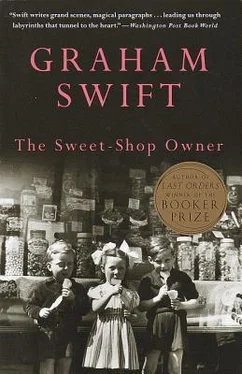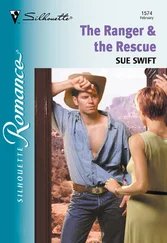Graham Swift - The Sweet-Shop Owner
Здесь есть возможность читать онлайн «Graham Swift - The Sweet-Shop Owner» весь текст электронной книги совершенно бесплатно (целиком полную версию без сокращений). В некоторых случаях можно слушать аудио, скачать через торрент в формате fb2 и присутствует краткое содержание. Год выпуска: 2012, Издательство: Vintage Books USA, Жанр: Современная проза, на английском языке. Описание произведения, (предисловие) а так же отзывы посетителей доступны на портале библиотеки ЛибКат.
- Название:The Sweet-Shop Owner
- Автор:
- Издательство:Vintage Books USA
- Жанр:
- Год:2012
- ISBN:нет данных
- Рейтинг книги:4 / 5. Голосов: 1
-
Избранное:Добавить в избранное
- Отзывы:
-
Ваша оценка:
- 80
- 1
- 2
- 3
- 4
- 5
The Sweet-Shop Owner: краткое содержание, описание и аннотация
Предлагаем к чтению аннотацию, описание, краткое содержание или предисловие (зависит от того, что написал сам автор книги «The Sweet-Shop Owner»). Если вы не нашли необходимую информацию о книге — напишите в комментариях, мы постараемся отыскать её.
The Sweet-Shop Owner — читать онлайн бесплатно полную книгу (весь текст) целиком
Ниже представлен текст книги, разбитый по страницам. Система сохранения места последней прочитанной страницы, позволяет с удобством читать онлайн бесплатно книгу «The Sweet-Shop Owner», без необходимости каждый раз заново искать на чём Вы остановились. Поставьте закладку, и сможете в любой момент перейти на страницу, на которой закончили чтение.
Интервал:
Закладка:
Don’t move. Think of nothing.
They called in the doctor. Lie still, he said. And they sent me to a Home in Surrey where they talked to me and nodded gravely over me and finally left me sitting by myself in a chair.
They didn’t visit me at the Home. They came there once to admit me (Jack drove, in the black Humber, and they gave me discreet, do-as-you’re-told kisses) and once to discharge me. I sat in a grey easy chair by the window with my feet on a floor that was polished twice daily. I lifted my legs for the orderly to wield his mop and he swept on around me, so that I was marooned. But I didn’t move. Outside there were lawns, a gravel drive, two rows of clipped yews, rose beds, a red brick wall with wrought iron gates. So neat, so symmetrical. It didn’t belong to me, none of it. But I watched the gardener, with the mower, and the rake, and then with the shears and ladder for the yew trees. He had baggy trousers, braces, a red face, and as he worked (I couldn’t hear, but I saw his lips draw in and his cheeks expand) he whistled. Patients in striped bath-robes and ill-fitting jackets, for whom his garden meant nothing, for whom there was fire in the rose beds, havoc in the crunching gravel, mooched by, but he worked on, asking no questions. First one yew tree then the next. Was I really ill, Willy? I was concentrating hard so that the orderly wouldn’t sink through his shiny floor and the gardener wouldn’t slip from his ladder. I was responsible. How still but determined I sat, marooned in my easy chair. The gardener had almost finished the yew trees and the orderly had swept the floor for perhaps the twentieth time when they said I could go. I had found my balance, struck my bargain. ‘You are better,’ they said. ‘Better?’ I said. My things were packed in a brown suitcase and I put on my hat, tucking my hair under the rim like a woman who means to get her way. The orderly smiled (he was fond of me), ‘Nice to see you well again, Miss’; but I didn’t smile. I looked at him coldly: for there could be no question, not now. And beyond the lawns, beyond the brick wall, they were coming — I was ready for them — in the black, shiny Humber, Jack at the wheel, Paul by his side, Mother and Father in the back, with their heads erect and their hands, clean as marble, protruding from their cuffs. Down the Surrey lane, eyes watching the flashing trees. They would be coming soon. I was a skittle, Willy, but I wouldn’t fall. The gleaming car would turn through the wrought iron gates. Its tyres would crunch on the gravel.
There, be still. You must rest your back. I’ll put on the light; no, don’t stir. How little you know how you’ve kept my balance.
They brought me home. There were little shows of reconciliation. Father bought me a dress, my brothers perfume. They said, ‘Are you better?’ as to a child that has ceased its tantrums, and I said, ‘Yes,’ without smiling. But their verdict was firm and business-like. She has let us down once, she may let us down again; we cannot afford that embarrassment. So when you appeared, Willy, you were the perfect solution. What justice, what neatness. Let her have that little man. He’s as simple as she’s cracked and she’ll wish soon enough she’d settled for Hancock. And if he thinks he’s walking into money, he’ll regret it when he learns how cracked she is. They even bought me the house and gave me a settlement, half in cash, half in shares. For their own guilt in disposing of me had to be paid for, and the greater the payment the more stainless their conscience. What justice. The perfect solution. But they didn’t see how you would be my solution and how it was they who would lose.
How peaceful the evening is. Your head in my lap. There, look up now: see what you’ll always see if you never claim it. Only an image in a mirror, remember? What poise, what balance, Willy, this room, this moment. Nothing must be touched, nothing must be changed.
Had he slept? He woke out of a dream in which the objects in the room seemed to loom triumphantly — the chintz chairs, the clock on the mantelpiece, the pink and blue bordered cups in one of which there was tea he had forgotten to drink, the standard lamp with its spiralled stem. As if time had passed, years, and it was long after, and they seemed to be saying, those familiar objects, ‘See, we endured; things remain.’ But there she was; her face was above his, lit by the standard lamp and turned to one side. What loveliness. It was her lap in which his head rested, her hand which lay on his hair, and she was reading the newspaper, folded on the arm-rest of the sofa. She had noticed his eyes opening and her own had turned, widened, enjoined (what jewels!), as if they did the work of a finger to her lips — Don’t stir, don’t spoil the trick. ‘You slept,’ she said, moving her gaze at once away from his, back to the paper, as though ignoring something, some mystery perhaps too delicate to probe. And later she said, her eyes still on the paper: ‘There will be a war, Willy.’
Mrs Cooper watched him, standing like a sentry, at his counter. She’d worked once before in a shop. It was a book shop. Saturdays only, before the war. She was only seventeen. She’d wanted the book-seller to make a pass at her. She’d climbed up the steps in her new silk stockings to the top shelves. But nothing had happened.
8
War? What war?
He had lost his balance on a pair of ladders, fallen off and damaged his back. They wouldn’t take him for a soldier. He wouldn’t have the opportunity, as they put it, to ‘see action’. Such a strange phrase and such an odd notion — as if there were no action besides wars. Strange as that other phrase which would be repeated, now, over and over again, like the little deft stroke with which a seal is stamped: fallen, fallen in action.
Left, right. They were marching over the crunching gravel, past the rows of black Nissen huts, past the wire fencing, the white flag-pole, making patterns for the sergeant, left, right. There was grass beyond the wire fencing, the tussocked downs of Hampshire, twittering skylarks, scudding spring clouds. April, 1940. And some of those khaki figures out on the gravel fitted uneasily into the pattern making. Left, right. What did it have to do with ‘action’, this drill, this answering by numbers and naming of parts? What was the connection? And, see, one of them in the front rank as they halted, waiting to move off again, teetered forward on his toes, almost toppled, so that the sergeant could bawl — his favourite line — ‘Dohn anticipate the ordaah!’
He watched from the side window, amid the smells of webbing, waterproofing and polish. For though they hadn’t taken him for a soldier they’d given him a uniform: sent him his papers, examined him, made sly quips — ‘How did you get your back, soldier?’ — ‘Fell off some step-ladders’ — asked curt questions — ‘Civilian occupation?’ — ‘Shop-keeper’ — and by some unerring logic (they too didn’t doubt he was the shop-owner, the trader of wares) assigned him to: Royal Engineers, Carbury Camp, Stores. The others would see action — those there through the window were being prepared for action — but his duty would be Issue of Equipment — packs, blankets, pouches, helmets, all numbered, allocated, entered up in the record sheet, stamped, checked. What was the connection?
‘Squad Halt! Squad Shun! Squaaad!’ Patterns over the gravel. ‘That man! Dohn anticipate the ordaah!’
And now they must do their bit.
‘Sergeant! Have your men assemble with kit bags.’
‘Squaad!’
Right! One at a time, keep the line moving, look sharp. Blanket, ground sheet, move along, waterproof cape, back-pack, side-packs, two, steel helmet — make it fit or change yer ’ed — with netting, move along, webbing straps, bayonet sheath, water-bottle, keep it moving — that man, pick up that bleedin’ ’elmeht!
Читать дальшеИнтервал:
Закладка:
Похожие книги на «The Sweet-Shop Owner»
Представляем Вашему вниманию похожие книги на «The Sweet-Shop Owner» списком для выбора. Мы отобрали схожую по названию и смыслу литературу в надежде предоставить читателям больше вариантов отыскать новые, интересные, ещё непрочитанные произведения.
Обсуждение, отзывы о книге «The Sweet-Shop Owner» и просто собственные мнения читателей. Оставьте ваши комментарии, напишите, что Вы думаете о произведении, его смысле или главных героях. Укажите что конкретно понравилось, а что нет, и почему Вы так считаете.












